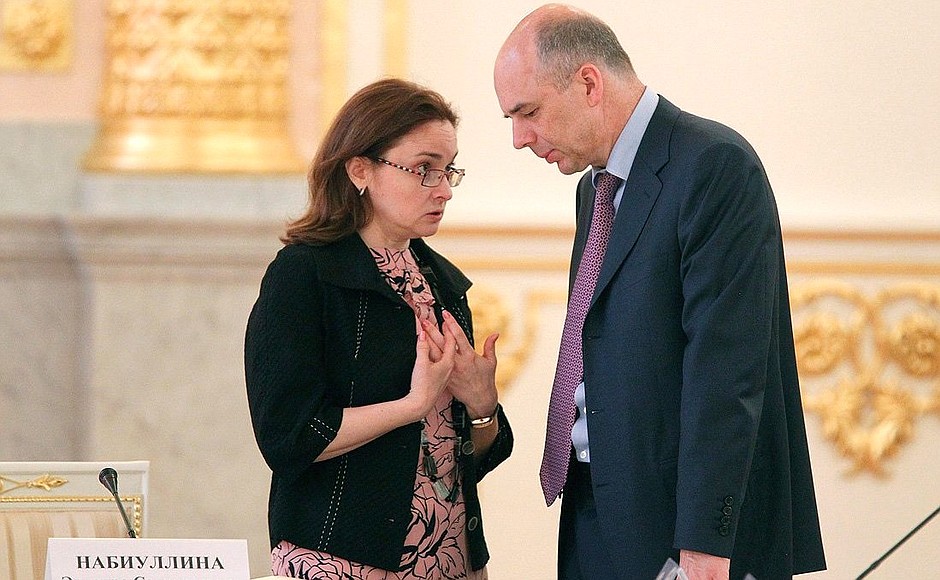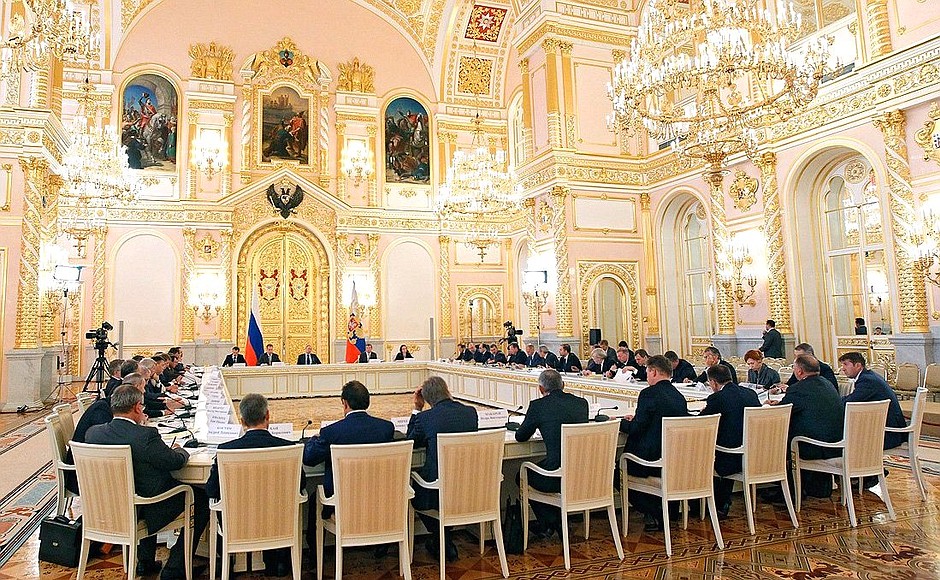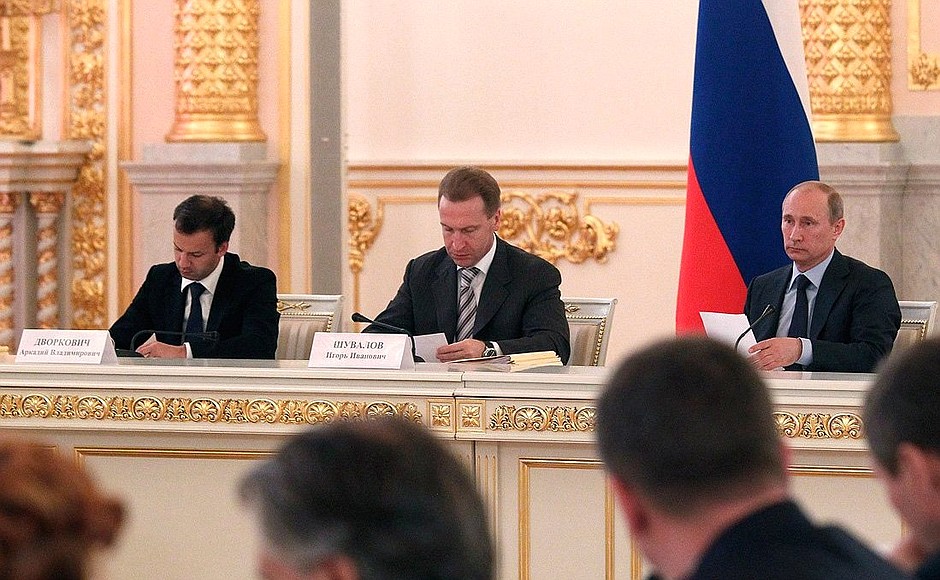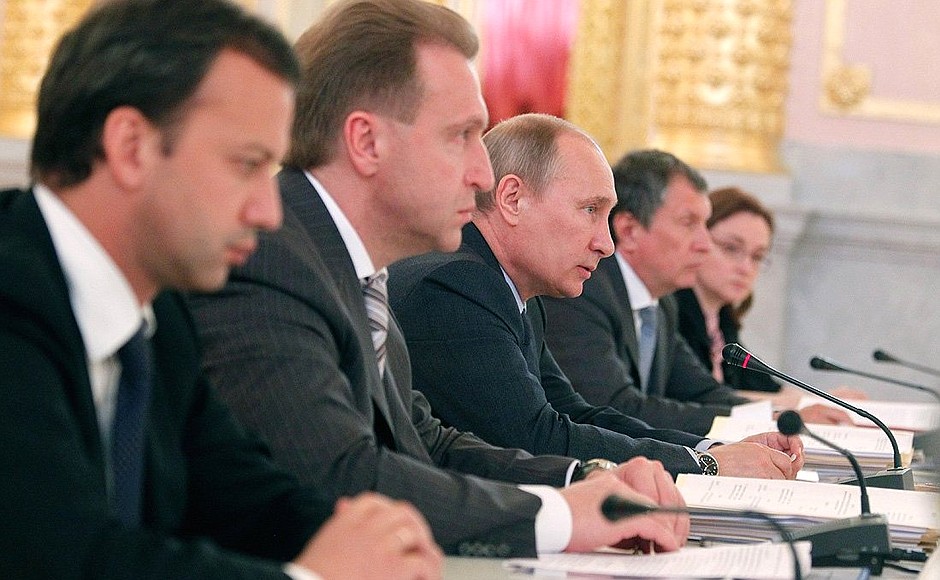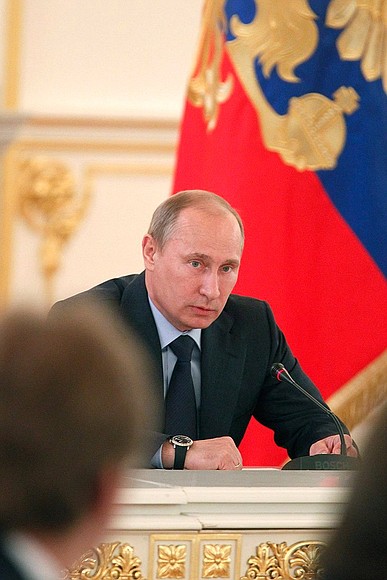The Commission was established in accordance with the President’s executive order. Its objectives are to coordinate the activities of executive bodies at all levels and organisations on the development of fuel and energy complex, ensuring industrial, energy and environmental security, sustainable use and efficient replenishment of the country’s mineral resources.
* * *
President of Russia Vladimir Putin: Good afternoon, colleagues,
You have such a formal atmosphere here, which is absolutely appropriate considering the gravity of the issues the newly established Commission will be working on and the importance of the energy sector for the economy today and in the future.
This is the first meeting of the Commission for Strategic Development of the Fuel and Energy Sector and Environmental Safety. The Commission is in charge of strategic coordination among all components of the Russian energy sector and promoting increased efficiency.
Let me emphasise straight away that the Commission’s efforts must never be perceived as a replacement for the Government’s work. The Government has its own prerogatives under the law, and this must and will be respected.
The Commission was created to coordinate our joint efforts in this crucial sector of the Russian economy, involving the direct participants of the energy market, scientists, representatives of public organisations and law enforcement agencies in order to analyse strategic development issues with the direct participation of the Government, which will be responsible for adopting the final decisions on various matters. Please keep this in mind.
On June 15 the Commission’s regulations and members were approved. In preparation for the first meeting, the Commission’s members submitted a number of proposals. I think that they should be analysed and taken into account in the formulation of the current and long-term agenda. Today, we must focus on the priorities for future work.
We are all aware and proud of the fact that Russia is one of the leading global energy powers. We have large energy reserves and impressive facilities for their processing and transportation. Our task is to use this bounty for the benefit of the Russian people, to promote economic development and social services, and strengthen the export potential of our country.
I want to highlight that in recent years the fuel and energy sector not only made a full recovery from the global economic crisis, but has also shown a growth pattern. Oil production has stabilised: it is about 510 million tons (you know this since all of you are experts here), and natural gas production in 2011 reached a historical high, exceeding 670 billion cubic metres.
The long-term foundation for the development of the fuel and energy sector is in place, the energy strategy up to 2020 is being implemented, the oil and gas industry development plans have been adopted, as well as the distribution of energy facilities and the coal industry development programme.
Experts estimate that in the coming decades energy demand, as well as the demand for derivatives will remain stable, both within Russia and in the global markets. Our goal is to provide a clear and uninterrupted operation of all mechanisms in the fuel and energy sector and decide on the parameters of its development. In this regard, I would like to draw your attention to the following key points.
First. We must expand the geography of hydrocarbons production in the coming few years. We have repeatedly said that the rate of raw materials replenishment is insufficient. We must actively start work offshore, while at the same time maximising the returns on existing projects.
Geological prospecting and exploration work must become more effective. This will strengthen Russia’s resource base and attract new investments, technology and the latest scientific developments to this area. This topic should be considered at the Commission’s future meetings.
I should add that the Government has already adopted a number of decisions aimed at stimulating the production of hydrocarbons on the shelf. We hope that this will give a strong impetus to the emergence of new oil and gas regions and the development of the industry as a whole.
Second. The fuel and energy sector of tomorrow is above all a high-tech industry. We have often been told that we are all too dependent on oil (and this is certainly true to some extent) and that we must develop high technology (this is also true), but we must not forget that today's oil and gas sector is nothing other than a high-tech industry. Both production and processing should use modern equipment based on the latest technologies, including energy efficient and resource saving technology.
The third important task is the expansion of international cooperation in the energy field. It is obvious that its economic attractiveness is very high. We all know that well. Moreover, we expect that it will grow even more after Russia’s accession to the World Trade Organisation. Therefore, we must make greater use of various forms of cooperation, more actively attract foreign capital and advanced technology, and follow the route of exchanging assets in the fuel and energy sector and related industries.
We already have such examples, they are widespread and appear very attractive and impressive, even by global economic standards. I have already mentioned (and you know about such examples in the electricity sector), that we have asset exchanges in the gas industry and in the petroleum industry. It is essential to provide stable rules of the game for our energy markets. This will enable foreign businesses to make long-term plans and implement large-scale investment programmes.
In turn, Russian companies should be more ambitious in offering their services on the international energy markets and more energetic in searching for new niches. In general, work in this area is quite active, and many colleagues here are making good progress in the markets of third countries. But I am sure more can be done.
Special attention will be given to developing energy cooperation with CIS countries. In this regard I want to note that the CIS is our special priority in many areas, both in our foreign policy and in the economy. I very much hope that energy industry professionals will do their best to promote our interests and the interests of our partners in order to accelerate the integration processes in the former Soviet Union.
Today I would like to hear your reports on advanced joint projects with our partners in the Commonwealth, including the possibilities of achieving a new, mutually beneficial partnership with individual countries. For example, in Kyrgyzstan we have such large-scale projects as the construction of Kambarata-1 hydroelectric power plant, Upper Naryn cascade of hydropower plants, as well as the construction of a coal thermal power station to guarantee energy supply in the autumn-winter period, when the risk of water shortages is high. Just recently, the President [Almazbek Atambayev] and I discussed those projects, and I know that very active analysis of all these areas of cooperation is currently underway.
I think that in future the Commission should discuss specific projects of strategic importance and with strong investment potential.
Next. Russian oil and gas companies are operating in global energy markets and are often leaders in attracting foreign investment. About 25% of the industry are currently owned by foreign investors.
I want to draw your attention to this, ladies and gentlemen: not all countries where the energy sector is as vital as in Russia, where we can say that it plays the most important role in the economy, have such a state of affairs. In this sense we have largely liberalised the state policy on fuel and energy: 25% is owned by foreign businesses. Look at the other major oil-producing countries. Which of them have the same situation?
The state will continue to pursue the policy of privatising state assets in line with the previous decisions (I want to stress this) and certainly taking into account the special significance of the fuel and energy sector’s contribution to the federal budget and energy security. We must pay special attention to this. Naturally, environmental protection should be at the forefront in deciding such policy matters.
I would like to ask you that in the course of our discussion today you state your views on the participation of Rosneftegaz oil and gas company in privatisation projects. I have followed the expert discussion on this subject closely. Of course, strictly speaking, the participation of Rosneftegaz in the acquisition of state companies’ shares can’t be termed privatisation in the true sense of the word. Nevertheless, we must proceed from the fact that we will act in compliance with the existing legislation with regard to the shares which Rosneftegaz could acquire and their amount. That is the first point.
Second. We must bear in mind that certain government decisions that were previously adopted have limited the revenues of some of our companies, and now they are in need of additional capitalisation. You should assist them in obtaining reasonably cheap loans to develop their activities.
And third: it does not mean that we should stop at Rosneftegaz’ participation in privatisation. Absolutely not. Let us discuss this topic today, too.
There is another aspect that we should pay attention to. Our objective is clean privatisation; this process must be completely transparent and honest with respect to our citizens and the state.
For example, large-scale projects in the electricity sector are being launched. Experts say that the current market capitalisation of RusHydro, for example, is $7.5 billion, which, of course, is too low. We know what kind of projects they are going to launch soon. We know the Boguchanskaya Hydroelectric Station and the Sayano-Shushenskaya Hydroelectric Station will be completed and the Far Eastern assets will be consolidated, so in the coming years the company's capitalisation will grow to $40 billion. So we cannot sell now something that will absolutely certainly be worth $40 billion for $7.5 billion!
We must take all of that into consideration. I believe that the approach to these issues should be fundamental, market-based and totally balanced, and we must proceed from the reality of the economic situation in the world and in Russia.
I stress that the sale of state-owned shares should make economic sense for the country and bring economic and systemic benefits. It is hard to tell which is more important; both the systemic and economic effects are vitally important, and the fiscal benefits must be absolutely obvious. Therefore, we must proceed, I repeat, from the real situation on the market.
Another matter that I would like to draw your attention to is the need to improve the management of companies with state participation. I would like to suggest that such companies consider increasing dividend payments, as Rosneft has already done. I do not insist on this, but I want you to focus on this matter and analyse your potential.
Next. We need to create the conditions for transparent functioning of the entire economic chain in the electricity industry, in particular, to bring order to the payment system. I would like to hear your concrete suggestions on ways to improve the payment system at all stages of pricing. Let me remind you that we have discussed this issue on numerous occasions, yet the consumers have not seen any benefits so far.
Finally, we must focus on protecting the environment as we develop the fuel and energy sector. All new projects must comply with the current environmental regulations and standards, and pass the relevant inspections. This logic must be incorporated in the new territorial development programmes.
I hope that the Commission will actively contribute to addressing these problems, and that its work will be filled with concrete strategic and systemic content, and in some cases, for example, those related to resource management, it is time to move on from discussions to legislative consolidation and final decisions.
What do I mean? Strategic deposits of federal importance (with reserves of over 70 million tons of oil and over 50 billion cubic metres of gas) should be allocated through auctions, without tenders. Tenders are inefficient and, most importantly, they are not transparent. There is another aspect, one that is purely fiscal. As we all know, the budget gets higher revenues from tenders, but still the transparency of the procedures is more important.
In conclusion, I will repeat: our task is to build a high-tech fuel and energy industry. It should become a factor in the growth of Russian economy, stimulate the creation of new and highly skilled jobs, and in general, work for the benefit of national development. If our efforts are consolidated, we are certain to achieve this goal.
Let us proceed directly to the discussion.
<…>
